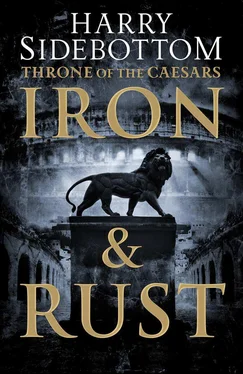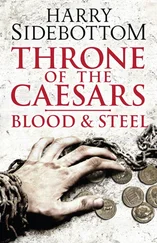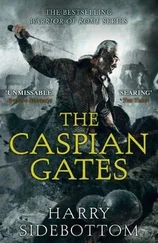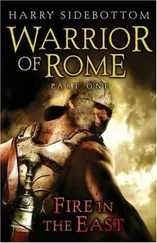Harry Sidebottom - Iron and Rust
Здесь есть возможность читать онлайн «Harry Sidebottom - Iron and Rust» — ознакомительный отрывок электронной книги совершенно бесплатно, а после прочтения отрывка купить полную версию. В некоторых случаях можно слушать аудио, скачать через торрент в формате fb2 и присутствует краткое содержание. Год выпуска: 2014, Издательство: HarperCollins Publishers, Жанр: Исторические приключения, на английском языке. Описание произведения, (предисловие) а так же отзывы посетителей доступны на портале библиотеки ЛибКат.
- Название:Iron and Rust
- Автор:
- Издательство:HarperCollins Publishers
- Жанр:
- Год:2014
- ISBN:нет данных
- Рейтинг книги:4 / 5. Голосов: 1
-
Избранное:Добавить в избранное
- Отзывы:
-
Ваша оценка:
- 80
- 1
- 2
- 3
- 4
- 5
Iron and Rust: краткое содержание, описание и аннотация
Предлагаем к чтению аннотацию, описание, краткое содержание или предисловие (зависит от того, что написал сам автор книги «Iron and Rust»). Если вы не нашли необходимую информацию о книге — напишите в комментариях, мы постараемся отыскать её.
Iron and Rust — читать онлайн ознакомительный отрывок
Ниже представлен текст книги, разбитый по страницам. Система сохранения места последней прочитанной страницы, позволяет с удобством читать онлайн бесплатно книгу «Iron and Rust», без необходимости каждый раз заново искать на чём Вы остановились. Поставьте закладку, и сможете в любой момент перейти на страницу, на которой закончили чтение.
Интервал:
Закладка:
The death of Paulina was said to have maddened Maximinus. The Emperor had raged, attacked Catius Clemens, threatened to blind his own son. The Thracian had tortured Macedo to death with his own hand. Orders had been issued for the arrest of everyone connected to the conspirators. It was common knowledge that Timesitheus had been a friend of Macedo. Volo’s frumentarii must have told him about them hunting, just the two of them, the day before Timesitheus had left for the East. Volo was inscrutable. Surely Domitius did not know about that outing. The Prefect of the Camp hated Timesitheus with a vengeance. Domitius had access to Maximinus, and would have denounced him straight away.
It was possible both men knew and that, against all probability, the influence of his dull-witted cousin had protected Timesitheus. In a typically repetitive and badly phrased letter, Sabinus Modestus had boasted of his new-found standing with Maximinus. He had won the Emperor’s favour by fighting like a Homeric hero in the battle in the German forest. Of course, his dearest relative had seen him smiting the barbarians as Paris or Thersites had smote the Trojans. More recently, during the revolt, he had captured a dangerous officer of Macedo who had been tampering with the loyalty of his troops. How that had come about was not explained, and Timesitheus could not imagine. Had this centurion walked up to Modestus and announced that he was a seditious revolutionary and, like a Christian, that he wanted to die? Maximinus had asked Modestus to name his reward. Untold riches, adlection to the Senate, powerful governorships — anything had been within his grasp. Modestus had said he wanted nothing but to serve the Emperor by continuing to command the cataphracts. From a man of intelligence, it would have been a reply of genius, a public exhibition of old-fashioned loyalty and duty. From Modestus, it merely laid bare his complete lack of ambition and understanding.
The small party crested the final range of stony hills, and there to the south-east were Samosata and the Euphrates. Timesitheus reined in to look. His service in Alexander Severus’ Persian campaign had not brought him this far north. The town was large and sprawling, its outer walls following the lines of natural declivities. Inside, the streets appeared to follow no plan, but he could make out the usual open spaces and temples. The whole was dominated by a citadel cited on a tall, flat-topped hill. The great river ran close beneath the far walls and the wide level plains of Mesopotamia spread out beyond.
Timesitheus pushed down the thought of what might happen in the town and signalled the column to advance. The wheel of fortune never halts; you either rise or fall. He had travelled a long way for this meeting. To Sinope, at the eastern extremity of his province, across high Cappadocia through Comana, Sebasteia and Melitene; too far for a faint heart now. A large part of him wished the summons had never arrived, or that he had set it aside as if unread. Yet Tranquillina had been right. It might have been as dangerous to ignore as to attend.
The gate was open, but a queue of rustic wagons and peasants on foot were waiting to be admitted. Timesitheus sent a rider ahead to clear them out of the way. Even so, there was a delay. The walls of Samosata were faced in a diamond pattern of bricks, unusual for fortifications. There were buttresses every few paces. They would hinder the enfilading shooting of the defenders. In any event, the town walls were too long to be held except by an enormous body of men. The citadel looked more defensible. The legionary base somewhere within the town might make another strongpoint. The town itself, however, would fall to any attacker with reasonable numbers and enough determination.
A young tribune from the 16th Legion riding a glossy chestnut led them inside, and along a street which ran straight to the foot of the citadel. There, Timesitheus took leave of his escort, dismounted and made the ascent on foot. He was puffing by the time they reached the top. He stopped and got his breath before letting the officer conduct him past a basilica and into a south-facing garden. The others were already here, sprawling on couches under the stern marble gaze of a rank of famous philosophers.
As Samosata was in Syria Coele, its governor, Junius Balbus, was playing host. He introduced the others: Licinius Serenianus of Cappadocia, Otacilius Severianus of Syria Palestina, Priscus of Mesopotamia. Timesitheus knew these other three governors. He had not met the young princes Chosroes of Armenia and Ma’na of Hatra, nor Manu, the heir to the abolished kingdom of Edessa. The latter was a surprise. The last Timesitheus had heard, Manu had been a prisoner of the Persians.
Servants spread a table with food and drink, then withdrew out of earshot. For a time, conversation was general and trivial. Timesitheus arranged his face and let it flow over him. The wall of the basilica was finished in the same diamond pattern as the town walls. Once, it must have been the palace of the vanished Kingdom of Commagene. Perhaps it was thoughts of the transience of power that made Timesitheus suddenly feel very afraid.
No governor was allowed to leave his province without imperial authority. No sanction had been given, yet here he was with four other governors, who between them controlled eight of the eleven legions in Rome’s eastern territories. Priscus was related to Otacilius Severianus by marriage, Licinius Serenianus was his close friend, and the same was true of Timesitheus himself. Lucretius of Egypt and Pomponius Julianus of Syria Phoenice had been appointed by the regime of Maximinus, and they had not been invited. Then there was the presence of the sons of two client Kings, and a man whose birthright had been taken from him. Priscus had called this conference to discuss a coherent strategy against the Sassanid attack. But an observer from the Emperor’s court — a perspicacious man such as Flavius Vopiscus or Catius Clemens, let alone a hostile witness like Domitius — might well doubt that motive. Indeed, they might well reach the same conclusion as Timesitheus had himself.
‘Thank you for coming.’ Priscus’ face was heavily lined, serious. Everyone listened.
‘Persian cavalry are less than sixty miles from where we sit. Bypassing Hatra and Singara, a Sassanid army — infantry and cavalry, said to be twenty thousand-strong — is besieging Nisibis. A mounted column is camped before Resaina. Its outriders have been seen as far west as Carrhae. Depleted by drafts for the northern war, the forces at my disposal in Mesopotamia cannot meet this threat in the field. You command six legions and a greater number of auxiliaries between you. Unless we take drastic action, the cities of Mesopotamia will fall one by one.’
‘If the lands between the two rivers are lost, the whole ast is in danger,’ Licinius Serenianus said. ‘I can send four thousand legionaries and the same number of auxiliaries from Cappadocia.’
Otacilius Severianus spoke next, with evident reluctance. ‘My men would have much further to march. Palestina is much further away.’
‘And so less exposed.’ Licinius Serenianus spoke sharply.
‘That is true.’ Otacilius Severianus looked at his brother-in-law. Priscus nodded almost imperceptibly.
Timesitheus wondered if the nervous Otacilius Severianus had the courage to say whatever it was he had obviously been told to say.
‘They would be longer on the road, but I can pledge the same from Palestina.’ Otacilius Severianus looked unhappy at the idea.
All eyes turned to Junius Balbus. ‘Before assembling a field army, we should seek imperial permission,’ the corpulent Senator said.
‘There is no time,’ Priscus said. ‘Mesopotamia will be gone before a messenger returns from the North.’
Читать дальшеИнтервал:
Закладка:
Похожие книги на «Iron and Rust»
Представляем Вашему вниманию похожие книги на «Iron and Rust» списком для выбора. Мы отобрали схожую по названию и смыслу литературу в надежде предоставить читателям больше вариантов отыскать новые, интересные, ещё непрочитанные произведения.
Обсуждение, отзывы о книге «Iron and Rust» и просто собственные мнения читателей. Оставьте ваши комментарии, напишите, что Вы думаете о произведении, его смысле или главных героях. Укажите что конкретно понравилось, а что нет, и почему Вы так считаете.












